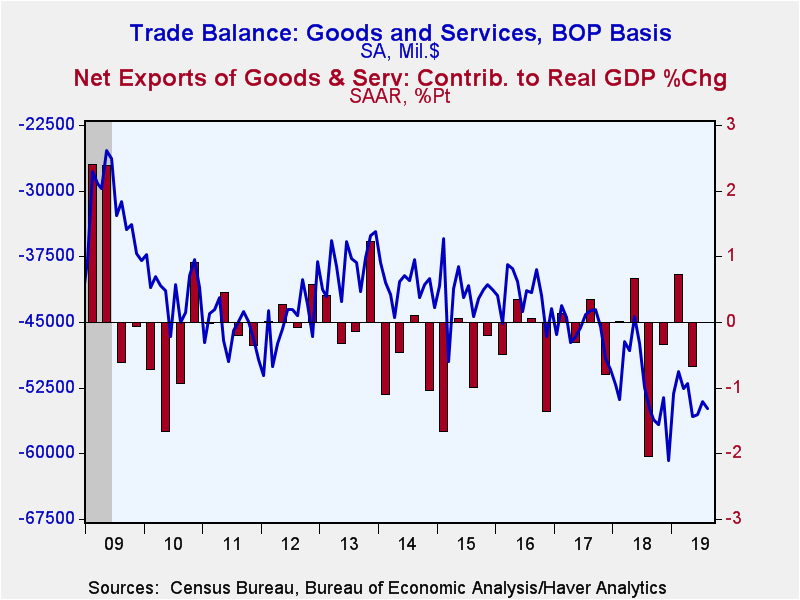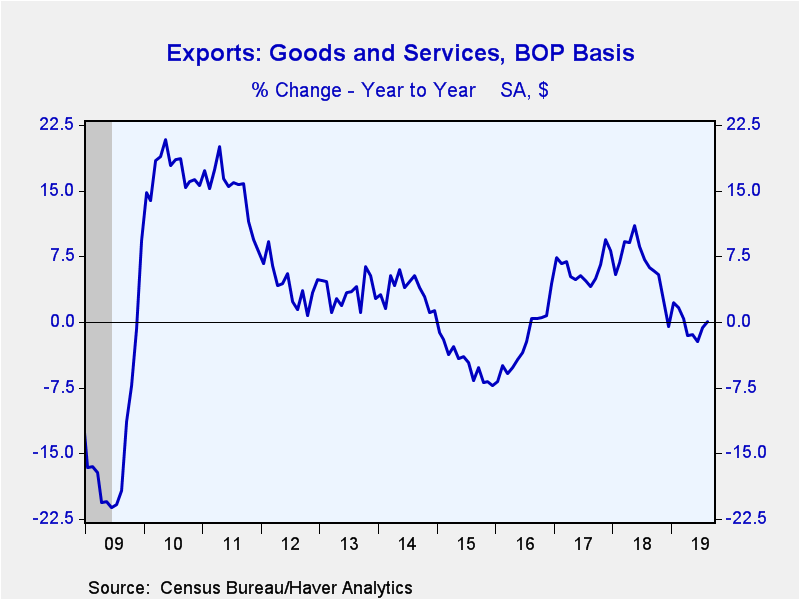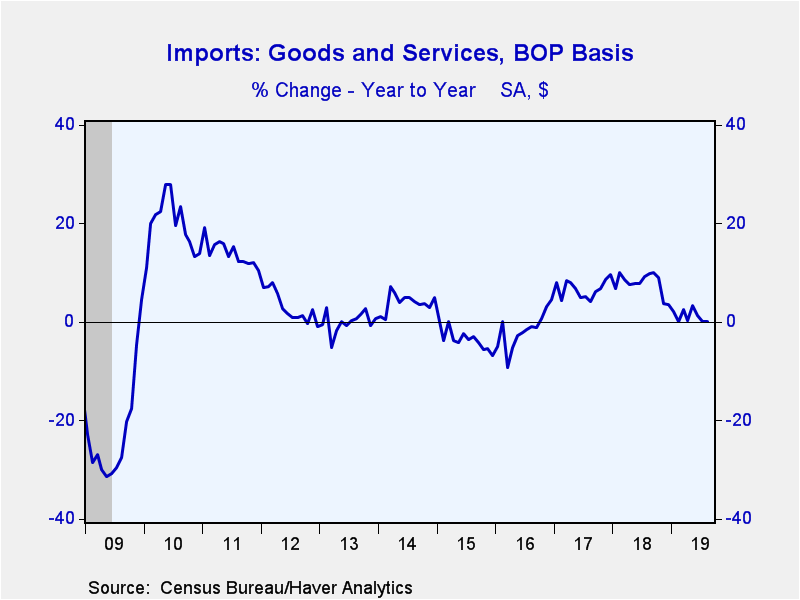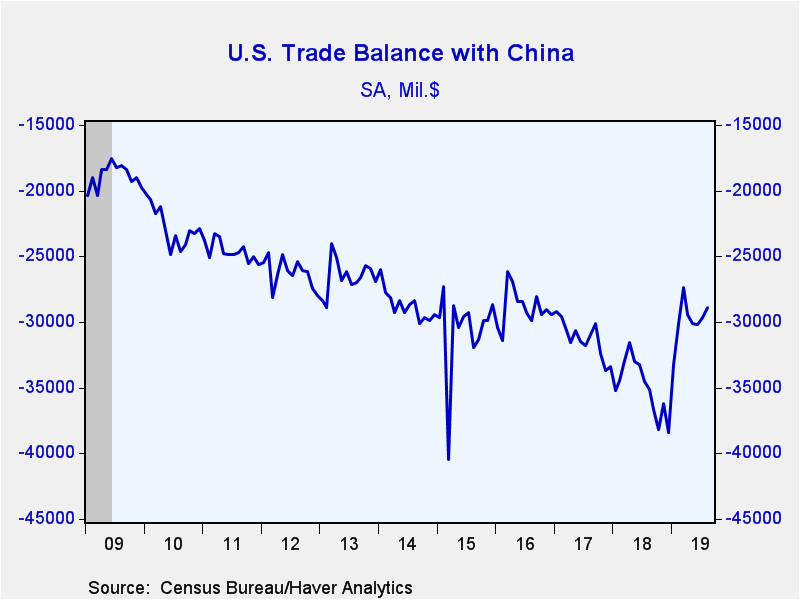 Global| Oct 04 2019
Global| Oct 04 2019U.S. Trade Deficit Widens in August
Summary
The U.S. trade deficit in goods and services widened a bit more than expected to $54.9 billion in August from an unrevised $54.0 billion in July. The Action Economics Forecast Survey anticipated $54.6 billion. Exports rose by 0.2% [...]
The U.S. trade deficit in goods and services widened a bit more than expected to $54.9 billion in August from an unrevised $54.0 billion in July. The Action Economics Forecast Survey anticipated $54.6 billion. Exports rose by 0.2% (0.1% year-over-year), while imports increased 0.5% (unchanged y/y). The real (inflation-adjusted) goods trade balance widened a touch to $85.7 billion (chain-weighted 2012$) in August from $85.4 billion in July. This data suggests that the trade deficit will continue to be drag on GDP growth in the third quarter.
The nominal deficit in goods trade grew to $74.4 billion in August from $73.6 billion. Exports of goods gained 0.3% (-0.1% y/y), led by a 4.1% jump in foods, feeds and beverages (8.5% y/y). Industrial supplies increased 3.4% (-0.8% y/y) powered by an 11.3% surge in the quantity of petroleum exports (21.1% y/y) -- petroleum prices fell so the dollar-value only increased 6.8% (4.7% y/y). Autos grew 2.7% (11.2% y/y). These gains were mostly offset by a 4.8% and 3.1% drops in non-auto consumer and capital goods exports (-3.7% and -5.1% y/y respectively).
Imports of goods rose 0.5% (-1.1% y/y) in August. In contrast to exports, capital and consumer goods both experienced growth of 3.4% (-0.8% and +7.3% y/y respectively). Meanwhile, foods, feeds and beverages were down 1.2% (+2.5% y/y) while autos fell 2.4% (+1.1% y/y). Industrial supplies imports dropped 3.3% (-14.0%) as both prices and quantities of petroleum imports fell -- the quantity of petroleum imports were decreased 3.7% (-11.8% y/y).
The surplus on trade in services was little changed at $19.5 billion, though that was down from $21.6 billion twelve months earlier. The value of services exports edged up 0.1% (+0.6% y/y), Business services gained 0.4%, (3.2% y/y), tourism ticked up 0.1% in both August and from a year ago, financial and insurance rose 0.9% (-1.0% y/y), while intellectual exports declined 0.3% (-3.1% y/y). Imports of services grew 0.2% (5.2% y/y) with a 0.2% decline in tourism (+4.3% y/y) more than offset by a 0.4% gain business services (3.7% y/y).
The politically-sensitive goods trade deficit with China narrowed to 28.9 billion in August from $29.6 billion. Exports to China jumped 7.3% (+3.1% y/y) after declining in the previous two months. Imports edged down 0.1% (-13.3% y/y), the third consecutive decrease. The trade deficit with the European Union ticked down to $15.6 billion from $15.9 billion as 3.8% gain in exports (9.2% y/y) more than offset the 1.8% growth in imports (7.9% y/y).
The international trade data, including relevant data on oil prices, can be found in Haver's USECON database. Detailed figures on international trade are available in the USINT database. The expectations figures are from the Action Economics Forecast Survey, which is carried in AS1REPNA.
| Foreign Trade in Goods & Services (Current $) | Aug | Jul | Jun | Aug Y/Y | 2018 | 2017 | 2016 |
|---|---|---|---|---|---|---|---|
| U.S. Trade Deficit ($ bil.) | 54.90 | 54.04 | 55.51 | 54.89 (8/18) |
627.68 | 550.12 | 502.98 |
| Exports of Goods & Services (% Chg) | 0.2 | 0.6 | -1.9 | 0.1 | 6.3 | 6.2 | -2.2 |
| Imports of Goods & Services (% Chg) | 0.5 | -0.1 | -1.7 | 0.0 | 7.8 | 6.8 | -1.7 |
| Petroleum (% Chg) | -7.7 | 0.3 | -13.9 | -23.7 | 20.8 | 27.2 | -19.4 |
| Nonpetroleum Goods (% Chg) | 1.2 | -0.3 | -0.9 | 1.3 | 7.5 | 5.5 | -1.3 |
Gerald D. Cohen
AuthorMore in Author Profile »Gerald Cohen provides strategic vision and leadership of the translational economic research and policy initiatives at the Kenan Institute of Private Enterprise.
He has worked in both the public and private sectors focusing on the intersection between financial markets and economic fundamentals. He was a Senior Economist at Haver Analytics from January 2019 to February 2021. During the Obama Administration Gerald was Deputy Assistant Secretary for Macroeconomic Analysis at the U.S. Department of Treasury where he helped formulate and evaluate the impact of policy proposals on the U.S. economy. Prior to Treasury, he co-managed a global macro fund at Ziff Brothers Investments.
Gerald holds a bachelor’s of science from the Massachusetts Institute of Technology and a Ph.D. in Economics from Harvard University and is a contributing author to 30-Second Money as well as a co-author of Political Cycles and the Macroeconomy.
More Economy in Brief
 Global| Feb 05 2026
Global| Feb 05 2026Charts of the Week: Balanced Policy, Resilient Data and AI Narratives
by:Andrew Cates









